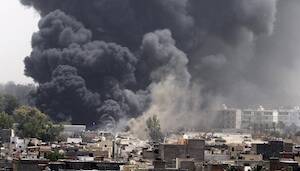As NATO bombs continue to fall over Libya, some challenge the air campaign. A new concept in international relations, “the responsibility to protect,” was a key concern of the U.N. Security Council Resolution authorizing intervention. Gerard Powers, director of Catholic Peacebuilding Studies at the Kroc Institute for International Peace Studies at the University of Notre Dame, said that while the Libyan leader Muammar el-Qaddafi’s threat to civilians forfeited his government’s right “to be protected by norms of sovereignty and nonintervention,” NATO’s dependence on military action poses a moral dilemma. “If the military objective is really regime change, that’s hard to justify in Catholic approaches to humanitarian intervention,” he said. Instead of military intervention, Powers called for nonmilitary steps, including sanctions, political pressure and diplomacy. “In Libya, we have a disconnect between ends and means,” Powers said. “Airstrikes seem to be a tactic impersonating strategy, and without a viable strategy, military might easily masquerades as humanitarianism.”
Libya Strategy Questioned
Show Comments (
)
Comments are automatically closed two weeks after an article's initial publication. See our comments policy for more.
The latest from america
Pope Leo said that if the teen “had come all the way to Rome, then (the pope) could come all the way to the hospital to see him.”
A Reflection for Tuesday of the Eighteenth Week in Ordinary Time, by Molly Cahill
As emergency workers searched for survivors and tried to recuperate the bodies of the dead, Pope Leo XIV offered his prayers for people impacted by the latest shipwreck of a migrant boat off the coast of Yemen.
The Archdiocese of Miami celebrated the first Mass for detainees at “Alligator Alcatraz,” the Trump administration’s controversial immigrant detention center in the Florida Everglades.








